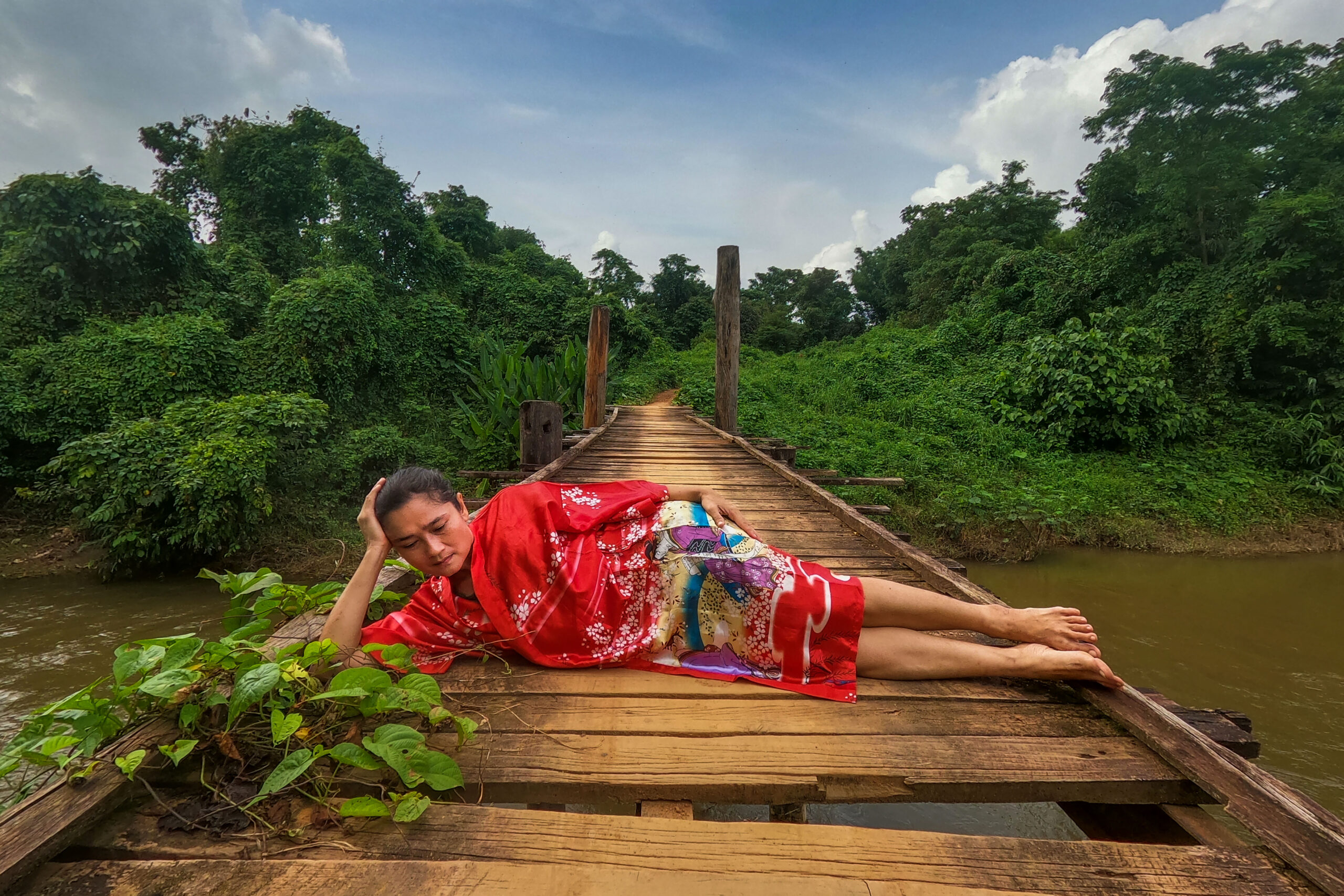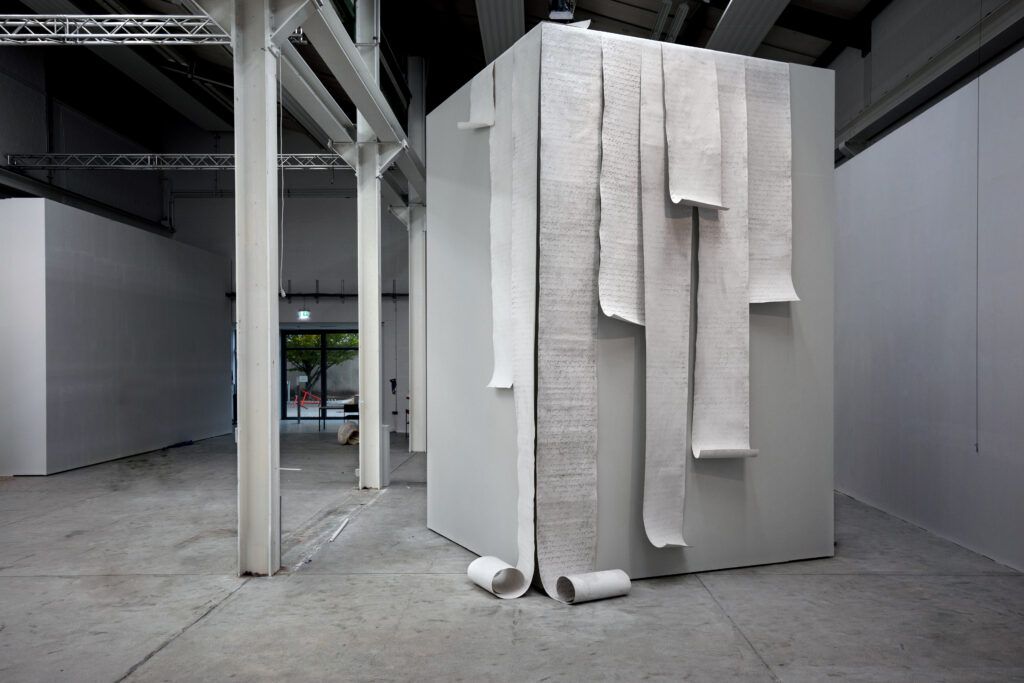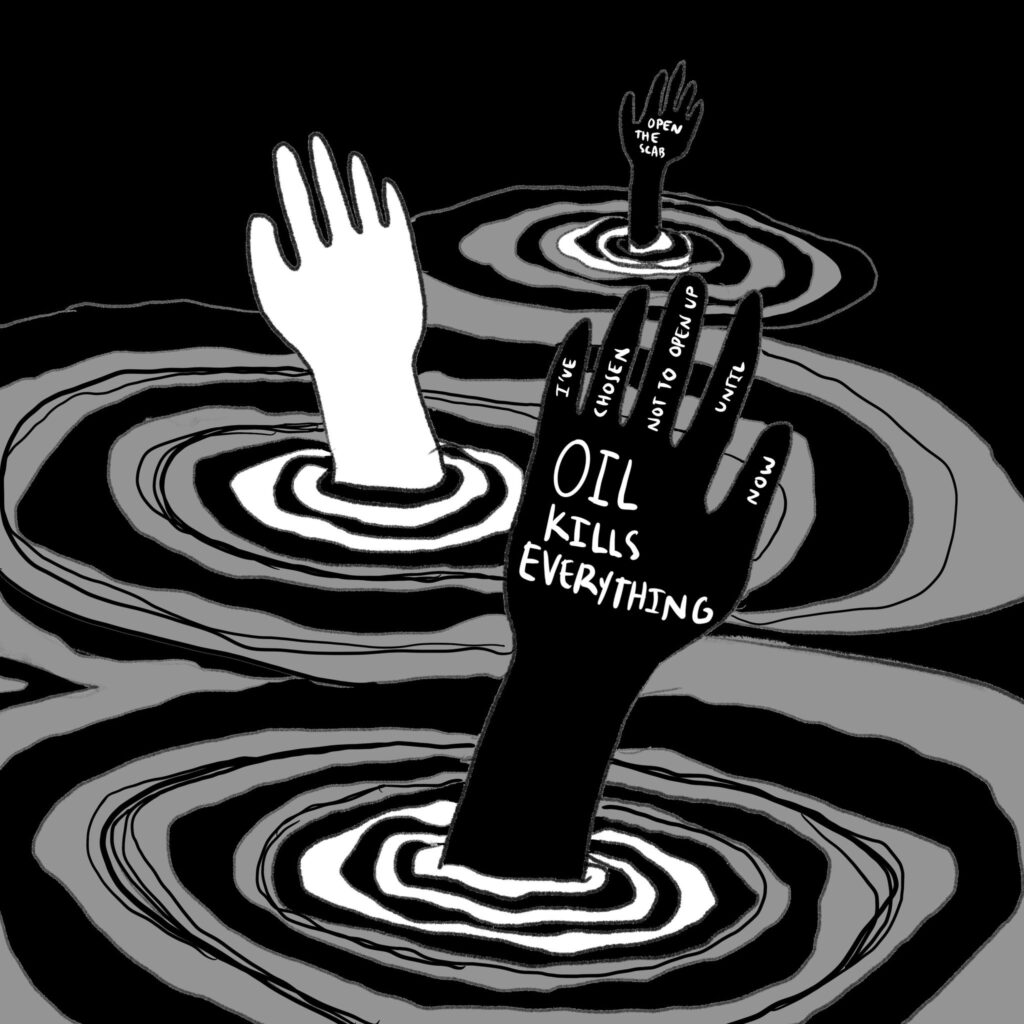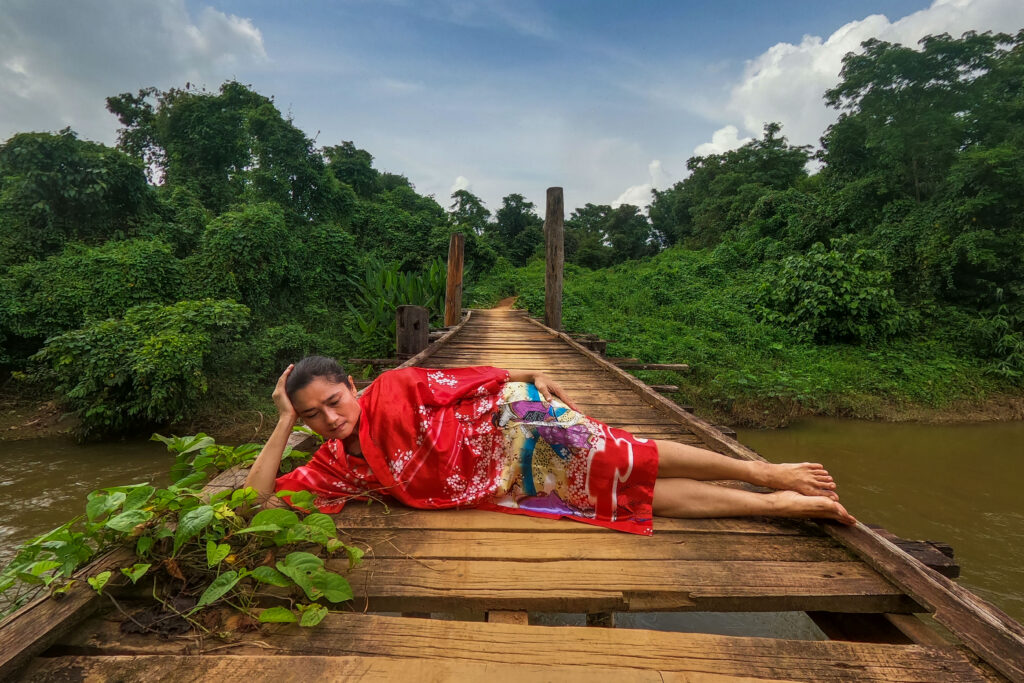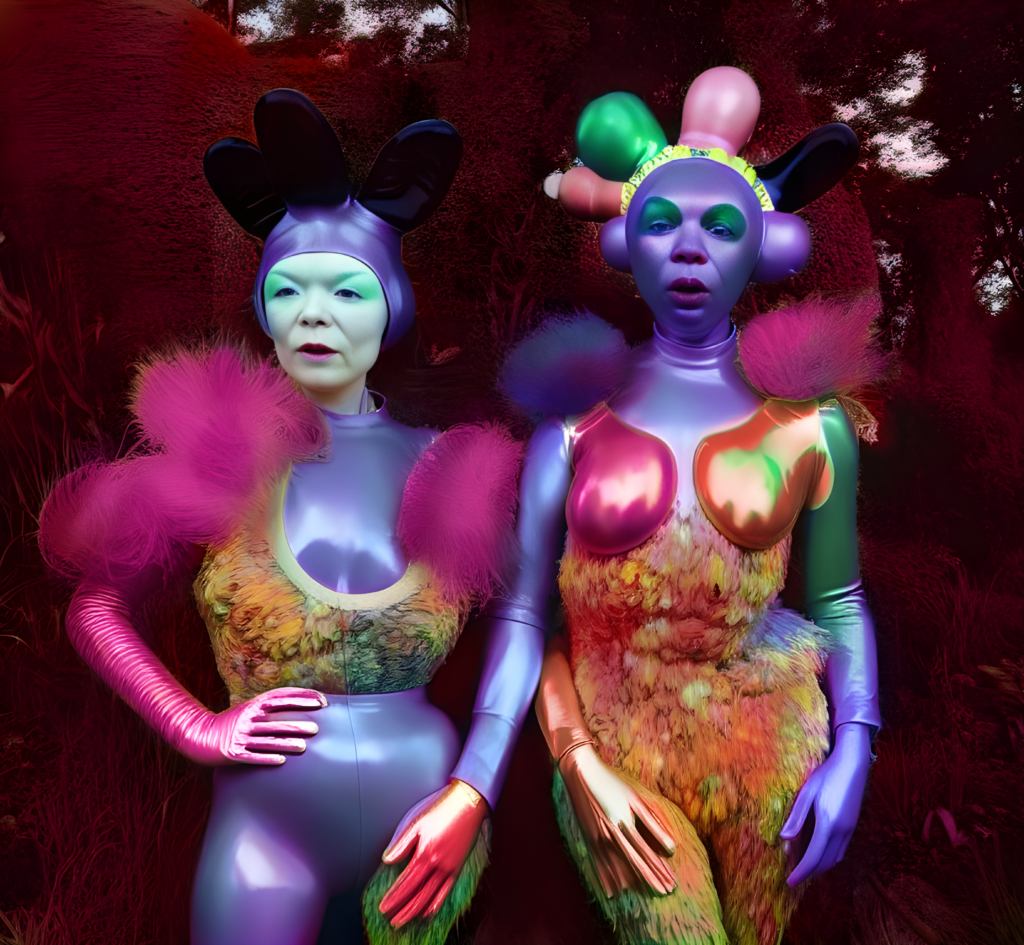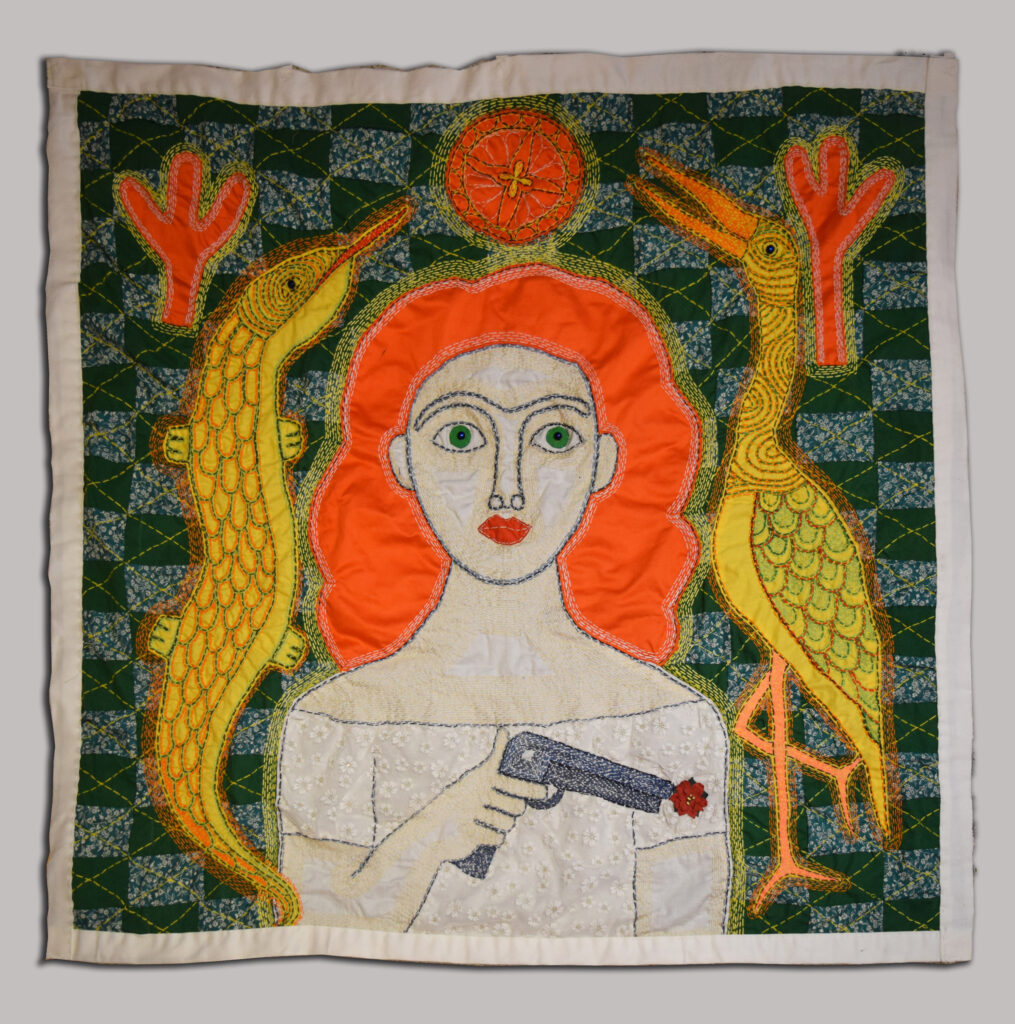Main Prizes for Mahsa Aleph (IR) and Taiye Ojo (NG)
- press release as PDF
- More about State of the ART(ist) & the prize winning projects
- Images via Flickr
(Linz/Vienna, 29.6.2023) In response to the start of the Russian war of aggression on February 24, 2022, the Austrian Foreign Ministry and Ars Electronica launched “State of the ART(ist)”. The joint initiative is intended to bring artists before the curtain who, at risk to life and limb, stand up against war, persecution and oppression and, above all, address Russian aggression and its fatal consequences. In the framework of an open call, a total of 357 submissions from 40 countries were received last year.
2023: 564 submissions from 58 countries
Also in 2023 “State of the ART(ist)” was carried out, but this time more broadly. Artists from all over the world who face existential threats and deal in their work with oppression and persecution by regimes and warring parties, exploitation by corporations and states, or natural disasters were addressed.
“With State of the ART(ist), we support artists worldwide who work under particularly difficult living conditions. With the cooperation with Ars Electronica, we make visible what would otherwise remain hidden and give threatened artists a space for their work. In doing so, we’re sending a clear signal for the right to freedom of art and expression,” says Foreign Minister Alexander Schallenberg.
An Open Call ran from March 15 to April 28, 2023, with a total of 564 artworks, actions, projects, and collaborative activities at the intersection of human rights and art submitted from 58 countries.
2023: Main prizes go to Mahsa Aleph (Iran) and Taiye Ojo (Nigeria)
In May 2023, the jury met and included Leila Nachawati Rego (Spain/Syria), Lucia Pietroiusti (Italy), Marita Muukkonen (Finland), Ivor Stodolsky (Germany/Finland), Simon Mraz (Austria), Christl Baur (Germany) and Martin Honzik (Austria). The two main prizes were awarded to Mahsa Aleph from Iran and Taiye Ojo from Nigeria. In addition, seven Honorary Mentions were awarded. All nine projects will be presented on-site in Linz as part of the 2023 Ars Electronica Festival. In addition, the works can be viewed in a virtual art gallery.
State of the ART(ist) 2023 – Main Prizes
Jowhar / Mahsa Aleph (Iran)
„Mit Hilfe von Tränenfängern und langen Papierrollen wäscht und recycelt sie [Mahsa Aleph] Wörter, um Vergangenheit und Gegenwart zu verbinden und die klassische persische Literatur neu zu interpretieren. In einer Zeit, in der das iranische Volk unter Unterdrückung und Repression leidet, ist diese Erforschung von Bedeutung und Kultur, die über stereotype Ansichten hinausgeht, ein tiefgreifender, wertvoller Beitrag.”
Statement der Jury
“Jowhar” (Farsi) is an ambiguous term: ink, essence, gem, nucleus and origin are translations that come close to what Masha Aleph wants to express. The artist presents an exploration of the mutual condition of the past and the future – using writing ink as an example. The installation consists of eight large rolls of paper on which the artist has written down a sentence from her own notebook over and over again, namely, “The future is only a part of the past that has been forgotten.” Based on different washes, one can see that the writing has gone through stages of development. The artist washed the text with water, taking away the color of the writing and thus showing that changes do not happen invisibly, but leave traces. The diluted ink that came off was collected, stored as a recycled product in “tear catcher jars” and presented in the installation as a start for everything new.
Aleph locates in the ink both the captured essence of all the words already written and the potential to develop new, different stories. For Jowhar, Mahsa Aleph receives the “State of the ART(ist) – Main Prize 2023.”
Credits
The research was done during a research grant in the bs project 2021 at Braunschweig University of Art. All rights belong to the artist.
AND IF WE OBSERVE THE PRESENT
Conversations with Bodo Oilfields / Taiye Ojo (Nigeria)
„The project AND IF WE OBSERVE THE PRESENT aims to addresses through poetic, visual and sonic landscapes the toxic legacy of oil pollution and neocolonial practices in Ogoniland, simultaneously calling to account those large, systemic forces at play in this environment, as well as bearing witness to the intimate, human-scale stories and realities of being there.”
Statement der Jury
The Niger Delta feeds the carbon cycle of our society – environmental sins and destruction are often concealed, especially by the people who nevertheless like to profit from it, says Taiye Ojo. In his creative work AND IF WE OBSERVE THE PRESENT, the artist, eco-activist and writer deals with the real living conditions in Ogoniland, whose resources have been exploited by international oil companies for decades and which is nevertheless considered one of the most diverse ecosystems on earth. A poetic reappraisal with poems – enhanced by visual, acoustic and interactive elements – makes the consequences of pollution and ruthless marketing tangible.
Working with Ogoni communities, learning about their cultural practices and eating habits, Taiye Ojo recognizes the close correlation between people and their habitat and shows the consequences experienced by the inhabitants of Ogoniland due to the heavy contamination of streams and how illegal waste disposal threatens the lives of indigenous peoples. What results is an artistically elaborated contemporary testimony of the intensity of destruction in the Niger Delta with all its consequences for local (social) life. For AND IF WE OBSERVE THE PRESENT Taiye Ojo receives the “State of the ART(ist) – Main Prize 2023”.
State of the ART(ist) 2023 – Honorary Mentions
Invasions 1.2.3 / Alevtina Kakhidze (Ukraine)
“Alevtina Kakhidze’s personal experiences growing up in the Ukraine and witnessing the country’s tumultuous history, including the recent brutal attacks, provide a profound backdrop for her remarkable work. […] The film is a testament to the power of art to document and illuminate the complex realities of war and its profound impact on both individuals and communities.”
Statement of the Jury
On the left a destroyed bridge and houses, on the right playing children, the happy dog Chuck and a freshly planted bed. INVASIONS 1.2.3 paints a picture of life and death in the Kiev region in 2022, which has just been liberated from Russian aggressors. The film accompanies Ukrainian artist Alevtina Kakhidze on her visits to Irpin, Muzychi and Mostyshche, where she meets people and their fates. A 360-degree camera documents every inch of destruction and suffering, but also hope. As the film progresses, her clothing changes from mourning to festive, and at the end we see her standing in her kitchen preparing a dinner of invasive plant species.
Alevtina Kakhidze is an artist and gardener, she works with drawings, video, installation and performance. Her artistic work revolves around questions of origin and identity, the meaning of nation and nationality, the role of Russian imperialism and colonialism, and that of Europe and the West.
Credits
- Commissioned by Manifesta 14 and Kosovo, 2022
- Idea: Alevtina Kakhidze
- Script and direction: Alevtina Kakhidze, Piotr Armianovski
- Camera and editing: Piotr Armianovski
- Sound editing: Serhii Kulbachnyi
- Music: Maksym Shalyhin
- Performers: Alevtina Kakhidze, Alexander Krolikowski, Oleksii Kovalenko, Anatol Stepanenko, Tamara Hryhorivna
- Support received from Manifesta 14
!Habesi / Indigene Corefio (ZA), Huuke Harris (ZA), Xam Sam Fortuin (ZA), Xopher Wallace (ZA), Dr Diana Ferrus (ZA), Sthando Masuku (ZA), Elder Nkosenathi Koela (ZA)
„This multidisciplinary exhibition of fine art, poetry, photography, sound and augmented reality returns life to the Khoe/Khoi/San indigenous communities of South Africa […] Through the “alchemy of art” and encounters with legends and activists, it gives an “ancient-future” to a community […] to remake a world on the brink of extinction.”
Statement of the Jury
“!Habesi” means “roots”. The term comes from the N|uu, the language of the San, who were the first wildcatters in southern Africa. Their language, which is threatened by extinction, comprises 112 different sounds, including 45 characteristic clicks, and has been passed down orally for generations. !Habesi campaigns for the land rights of the indigenous people, who were deprived of their homeland in the 17th century and are still prevented from reclaiming their land by the South African Land Rights Act passed in 1913. At the center of the project is Ouma Katrina (87) who, despite her age and the fact that she herself never learned to read or write, is fighting for the future of her people and their language. !Habesi has captured her stories in images, music, poetry and augmented reality and transformed them into a unique sound journey.
Credits
- Production: |Kx’am
- Sound production: Indigenous Frequency Cast
- Composer: Queen Katrina
- Indigenous instrumentalist: Mntana WeXwele
- Poet: Dr Diana Ferrus
- Poet: Indigene Corefio|Huuke Harris
- Researcher: Hamid Ntetha
- Fine artist: /Xam Sam Fortuin
- Videographer: Sthando Masuku
- AR visual artist: Xopher Wallace
- Costume: Gift Kgosi (No Modern Slave)
- Grace: Tsui Goab (God)
- Medicine: Our Divine Ancestors
Long Nights / Kholod Hawash (Iraq)
„Hawash’s vibrant, large-scale textiles “jodaleias” radiate with symbolism. Hand-sewn in traditional Iraqi technique, they inflect the life, dreams and nightmares of a woman escaping an oppressed and repressive society. [….] On reaching Helsinki in 2017, tradition gave way to bold demonstrations of freedom: A jodaleia portraying a naked woman. With a traffic cone on her head. The trauma of a haircut with a dragger. The artist mounted on a white horse, rearing over a chess board – her mind in free flight from the safety of the carpet of her new home.”
Statement of the Jury
Kholod Hawash is an Iraqi textile artist whose work is inspired by the cultural heritage of her former homeland – the region’s landscapes, symbols and local narratives. Because her husband and others around her were politically persecuted, she initially fled to Jordan before migrating to Finland with the help of the NGO Artists at Risk. With Long Nights, Kholod Hawash draws attention to the oppression of and violence against women in the Middle East. Carpets that stand for domesticity show images that stand for protest and detachment from oppression: Nudity, brutality, intimacy, and elements of a pristine nature flow into one another. By incorporating the demand for freedom into an ancient craft method traditionally used by women, Hawash’s art represents a clear feminist message: women are raising their voices.
Credits
With the support of the Kone Foundation, Finland.
Cosmic Land / Kira Xonorika (Paraguay)
„Through the power of machine learning Kira Xonorika created, supported by AI systems, creatures, or “multimodal bodies” using paragyan indigenous Guarani symbology and language together with trans aesthetics. The idea is that the images created challenge cultural hegemony and colonialism. Kira sees the transformative potential of metamorphosis and hybridity as a source of power.”
Statement of the Jury
Kira Xonorika’s work combines a background in art history with an interest in artistic exploration of the future. Magic as such takes on a special role. AI programs are used to experiment with post- and transhuman notions, and boundaries are challenged. Cosmic Land is a series that transcends civilizational and techno-utopias and explores a form of future in which bodies shed normative expectations and enter into a direct dialogue with nature. There is a reference here to indigenous cultures, where symbiosis with a non-human species focuses forces. The approach of extending the body is also found in queer cultures.
While AI systems are characterized by homogenizing tendencies, Cosmic Land focuses on cultural diversity and critique of the oppression of alternative life forms – which already underlay colonialism. Through her own approach, Kira Xonorika exposes a contradiction: AI is used to criticize its very basis, namely powerful standardization processes that determine technology and consequently social interaction.
Where is a place for me to sleep in peace? / Ma Ei (Myanmar)
„Artist Ma Ei offers a brave, eye-opening perspective of Myanmar and a conflict that gets little attention from mainstream media. This photography-performance series sheds light on the restless nights of Burmese people, focusing on the issue of sleep (or lack thereof) as a recurrent impact of conflicts against civilian population.”
Statement of the Jury
In November 2020, Aung San Suu Kyi’s National League for Democracy (NDL) was officially declared the winner of the elections in Myanmar – but was not recognized by the military. When the legislative period of the newly elected parliament was to begin on February 1, 2021, the military staged a coup and declared a state of emergency. Representatives of the people were arrested and the parliament dissolved. Since then, daily life in Myanmar has been marked – once again – by terror and violence. The artist Ma Ei’s photo series bears witness to the constant fear and the resulting sleeplessness that has become part of everyday life for millions of people. Where is a place for me to sleep in peace? shows the artist in a sleeping position and night robe in various places: “Even though I am now in a safe place, fear and worry still haunt me. I plan to keep working on this project, not only for the people of Myanmar, but for all people who have not yet found peace.”
Credits
- Kyaw Khant – Photography
- Naung Yoe – Photography
- Htet Wai – Photography and Photo Editing
Pictures of Nothing / Mac Andre Arboleda (Philippines), Rollyna Domingo (Philippines)
„Their film poignantly brings attention to what appears meaningless or empty – nondescript animal camera trap footage – and combines it with a textual reflection on the endangered work of frontline activists, as a way of reflecting on an increasingly oppressive culture of surveillance.”
Statement of the Jury
Pictures of Nothing is a video essay on the tension between the protection of animals on the one hand and the surveillance of humans on the other. The setting is the Philippines, a country that is one of the most threatened by climate change and at the same time one of the most dangerous places for environmental activists. While camera traps are used by some to study and protect endangered species such as the Palawan binturong (“bear cat” of the creeping cat family), very similar technologies are used by others to track inconvenient activists. For example, in the work of Andre Arboleda and Rollyna Domingo, “Nobody knows for sure how many of you exist” or “A computer can describe you based on your image” – a reflection on permanent surveillance strategies that go long beyond the animal world.
Credits
- Filmmakers: Mac Andre Arboleda and Rollyna Domingo
Camera trap data courtesy of ABConservation - Support received from:
- PARDICOLOR – http://pardicolor.org
Footprints of Ants / Ümit Güç (Turkey)
„In this captivating portrayal of desperation and ethnicised tension between local Kurdish workers and Syrian refugees in a Turkish camp. Ümit Güç’s film delves into labor, identities and immigration, reflecting his personal experiences growing up in the border region of Hatay. […] It is a work about resilience and shared humanity in individuals in the face of adversity.“
Statement of the Jury
Footprints of Ants shows the exhausting everyday life of Turkish and Syrian refugee farm workers. During the day, the men and women work in the fields in scorching heat, at night they sleep in the same tent camp. The hardship, which on the one hand unites them, on the other hand repeatedly causes anger and conflicts between locals and refugees to bubble up. One day, however, two children, Barış and Evin, disappear. Worried, the workers set out to find the two – and discover common values. Footprints of Ants consists of four parts: “Pain” shows the birth of a child and the associated pain of the mother, “Journey” focuses on the daily walk to the fields and that we humans are constantly on the move to look for work and earn money, the third part is called “Search” and asks what people who left their homeland are actually looking for, “Ricat”, an Arabic expression for military withdrawal, shows people who start the retreat inwards.
Credits
- Written and directed by: Ümit Güç
- Cast: Evin: Gurbet Kancak, Barış: Mahir Aslan, Selma: Fatma Zalim, Delal: Filiz Karadağlı Khaled: Khaled Dikko, Süleyman: Süleyman Bolat, Ercan Ertik, İsmail Emre Halvacı, Serdinç Çağlayan, Zeynep Arslan, Rabia Kancak, İbrahim Kancak, Bahçeköy ve Çadır Halkı
- Assistant Director: Arzu Görgülü
- Director of photography: Necati Öz
- Art director: Esra Fidantek
- Sound: Tuncay Ayvaz
- Camera: Cihan Kar
- Crew: Görkem Yazgan, İlker Cengiz Gül, Mahsun Tosun, Fırat Yetişgin, Orhan Sayın
